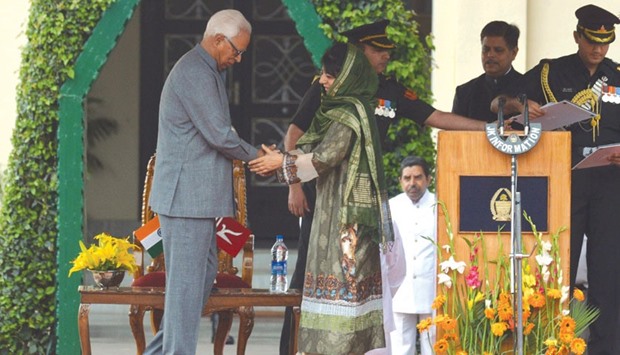
Mehbooba Mufti shakes hands with Jammu and Kashmir Governor N N Vohra after taking oath during her swearing-in ceremony in Jammu yesterday.
Mehbooba Mufti was sworn in yesterday as Jammu and Kashmir’s first woman chief minister, taking over from her father nearly three months after he died in office.
India’s only Muslim-majority state had been ruled directly from New Delhi since the death in January of Mufti Mohamed Sayeed, who formed an uneasy alliance with the Bharatiya Janata Party (BJP) after the 2015 election.
His daughter, who heads the People’s Democratic Party (PDP) that he founded in 1999, had initially appeared reluctant to continue the unpopular coalition with the BJP.
The PDP’s main support base is among Muslims in the Kashmir Valley, the epicentre of a separatist insurgency that broke out in 1989, although the party stops short of calling for independence for the state.
“Her key task will be to recoup the PDP’s credibility among her constituents (Kashmiri Muslims), which is at an all-time low, and manage support from Delhi vis-a-vis economic assistance,” political historian Siddiq Wahid said.
Mehbooba reached an agreement at a meeting with Prime Minister Narendra Modi last month, although the terms of their deal have not been disclosed.
The PDP has nine cabinet and three junior ministers - the chief minister included - and the BJP has eight cabinet and two junior ministers in the new government.
BJP leader Nirmal Singh remains the deputy chief minister.
Constitutionally, the Jammu and Kashmir council of ministers cannot have more than 25 members.
The PDP dropped two cabinet ministers - Altaf Bukhari and Javaid Mustafa Mir and inducted three-time legislator Zahoor Mir.
The other new face brought in as a junior minister by the PDP is Farooq Andrabi, who defeated state Congress president Ghulam Ahmad Mir from Dooru.
The BJP dropped cabinet minister Chaudary Sukhnandan and brought in his place Shyam Lal Chaudhary. The party also dropped a junior minister, Pawan Gupta.
